FAO and WHO call for action: addressing poor nutrition and obesity requires action along the whole food chain, from farm to fork
 23 September 2019 – Levels of overweight and obesity are rising across all ages in countries of the Eastern Mediterranean, Near East and North Africa Regions. In many middle- and high-income countries, half of adult women (50.1%) and more than two in five men (43.8%) are overweight or obese. In some countries, over 15% of children and more than half of adolescents are overweight or obese.
23 September 2019 – Levels of overweight and obesity are rising across all ages in countries of the Eastern Mediterranean, Near East and North Africa Regions. In many middle- and high-income countries, half of adult women (50.1%) and more than two in five men (43.8%) are overweight or obese. In some countries, over 15% of children and more than half of adolescents are overweight or obese.
In a joint workshop on “Leveraging food systems to combat obesity in the Near East and North Africa Region” the Food and Agriculture Organization of the United Nations (FAO), and the World Health Organization (WHO) are calling on governments to transform food systems to enable communities and individuals to make healthy choices and eat healthier food.
The causes of obesity are abundantly evident. They range from the absence of optimal fetal nutrition, unhealthy infant and child feeding practices, the increasing availability and promotion of unhealthy foods to lack of awareness and education and physical inactivity. While part of the solution lies in better nutrition education, it also depends on the availability of affordable, high quality and diverse food, including fresh products. This requires a much closer linkage between food producers and consumers, for the benefit of both communities.
A “food systems” approach to obesity looks at the entire food chain, from the farm to the plate, and seeks to promote changes in the way that food is produced, processed, distributed and consumed. It includes reducing consumption of highly processed food and bringing producers closer to consumers.
“Unhealthy diets are one of the key contributors to the burden of noncommunicable diseases in WHO’s Eastern Mediterranean Region, and rates of breastfeeding, which protects against obesity and noncommunicable diseases later in life, are low,” said Dr Ahmed Al-Mandhari, WHO Regional Director for the Eastern Mediterranean. He added, “Obesity and noncommunicable diseases can, however, be addressed through a food systems approach, with greater focus on promoting breastfeeding, increasing consumption of fruit and vegetables, and implementing salt, fat and sugar reduction strategies”.
People are much more likely to make healthier food choices when nutritious food is readily available, recognizable and affordable. “Making affordable, healthy diets accessible is possible,” explained Mr Abdessalam Ould Ahmed, FAO Assistant Director-General and Regional Representative for the Near East and North Africa, “if governments put in place public policies and laws aimed at influencing food environments for healthy diets”. In his address, Ould Ahmed also highlighted that the region's dependency on food imports is increasing. “This can contribute to a rise in overweight and obesity. Global food markets have increased the accessibility of ultra-processed food that is very cheap but energy-dense and nutrient poor, high in fat, sugar and salt,” he said. “In this regard, governments need to consider the way that food is produced, as well as how it is processed, stored, distributed, marketed and consumed”.
Promoting a healthy diet
Unhealthy diets are one of the major risk factors for a range of noncommunicable diseases, including heart attacks and stroke, cancer, diabetes and other conditions linked to obesity. Specific recommendations for a healthy diet include: eating more fruit, vegetables, legumes, nuts and grains, and cutting down on salt, sugar and fats. It is also advisable to choose unsaturated fats, instead of saturated fats.
Beat overweight, obesity and noncommunicable diseases
“Improving dietary habits is a societal, not just an individual problem, and is embedded in Sustainable Development Goal 2,” stated Dr Ahmed Al-Mandhari,. “Therefore, it demands a population-based, multisectoral, multi-disciplinary, and culturally relevant approach”.
“Access for all to healthy diets is critical for achieving the 2030 Sustainable Development Agenda and the food systems of the future must deliver healthy and quality food for all while preserving the environment,” declared Mr Abdessalam Ould Ahmed.
- Governments can transform food systems to improve access to affordable healthy diets, as well as develop and effect policies that promote/normalize healthy eating and living.
- Civil society groups, including nongovernmental organizations and the media, can work with individuals and communities to educate and diffuse key messages on the potent effects of overweight and obesity on health during childhood and adulthood, as well as the importance of adopting healthy behaviours like good dietary practices and active living.
- The private sector can help bringing consumers closer to producers, and promote food systems that are both healthier and more sustainable.
- Individuals and families can adopt healthier behaviours, share experiences, as well as ask for support and support others.
For more information, please contact:
WHO
Ms Nisreen Abdel Latif
Communications Officer for the Department of Universal Health Coverage/Noncommunicable Diseases
Tel: +202 227 65072
Email:
Website: www.emro.who.int/ncds
Twitter: @WHOEMRO
Food and Agriculture Organization of the United Nations
Ms Mariam Hamed Hassanien
Communications Officer for the Near East and North Africa
Tel: +202 33316000 (2777)
Mobile: +2 0100 733 5492
Email:
Website: www.fao.org/neareast
Twitter: @FAOinNENA
@FAOinNENA_EN


